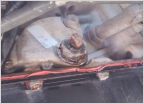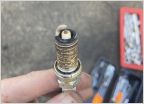-
Welcome to Tacoma World!
You are currently viewing as a guest! To get full-access, you need to register for a FREE account.
As a registered member, you’ll be able to:- Participate in all Tacoma discussion topics
- Communicate privately with other Tacoma owners from around the world
- Post your own photos in our Members Gallery
- Access all special features of the site
New Toyota engines are smaller but better; my question is 'by what metric?'
Discussion in 'Toyota Trucks & SUVs' started by secher, May 30, 2024.


 T100 or similar engine 3.4V6 5VZ-FE
T100 or similar engine 3.4V6 5VZ-FE Headlight bulb upgrade?
Headlight bulb upgrade? Oil Changes and Grease Fittings
Oil Changes and Grease Fittings Help! Vibration in 2nd gear
Help! Vibration in 2nd gear 91 Toyota Pickup Grill Guard
91 Toyota Pickup Grill Guard Highlander lighting upgrades
Highlander lighting upgrades






































